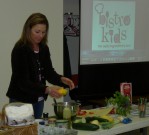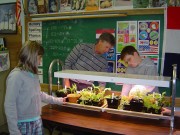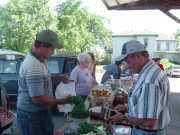Resource-Savvy Communities Generate Healthy, Sustainable Changes
The MU Healthy Lifestyle Initiative is helping redefine efforts to combat obesity, sedentary lifestyles
August 18th, 2010

In Lafayette County, Kiersten Firquain, a chef with Bistro Kids, presented a demonstration on creative ways to prepare fresh vegetables and incorporate them into school meals. She also taught knife technique at the Farm to Cafeteria workshop attended by area school food service staff. In 2007, Bistro Kids launched the Farm to School Lunch Program and currently feeds healthy lunches to nearly 1000 students in Kansas City and St. Louis.
COLUMBIA, Mo. – As the nation becomes more aware of health issues related to nutrition and lifestyle choices, communities are struggling to find ways to make healthy living easier. The University of Missouri is helping communities turn healthy ideas into sustainable changes through the Healthy Lifestyle Initiative. The initiative, underway at 13 sites in 12 Missouri counties, is aimed at changing environments to increase the availability of affordable, locally produced foods and access to safe physical activities.
The Healthy Lifestyle Initiative (HLI) began by partnering MU Extension specialists with community leaders in four Missouri counties. The MU Extension specialists provided assistance in the areas of agriculture, nutrition and physical activity, and business, community and youth development. Each team recruited a variety of stakeholders, including families, students, agricultural producers and healthcare providers, to develop and implement community plans focused on policy and environmental changes to support healthy lifestyles.
“The goal of HLI is to turn goals and ideas into action by identifying the resources and expertise already in place within communities,” said Ann Cohen, HLI co-director and associate state nutrition specialist in the MU College of Human Environmental Sciences. “Initiative leaders work alongside community members, bringing together local resources and university expertise to create sustainable change. The models being developed can be replicated by other communities to combat sedentary lifestyles and related diseases, and foster positive changes and lifelong health.”
The four initial counties (Lafayette, Dent, Ralls and Boone), selected in 2008, have seen positive changes. In Lafayette County, schools and local farms are participating in Farm to Cafeteria, a national project that brings locally grown fruit and vegetables into school cafeterias. Chefs with the Bistro Kids program teach creative ways to cook fresh vegetables, and the Kids in the Kitchen curriculum in Ralls County encourages youth to eat healthily by teaching them to prepare simple, healthy foods.
Several counties have established farmers markets to increase access to locally grown foods. In Lafayette and Dent, young entrepreneurs received training in commercial gardening through the local farmers market.
“I am a big supporter of buying local and now that our community has weekly farmers markets, I’m able to support local farmers and prepare healthier meals for my family and friends,” said Christy Fuenfhausen, a young professional and resident of Lexington. “The farmers market provides a wonderful opportunity to purchase a wide variety of fresh fruits and vegetables. It has been a huge success already, providing a local networking system, different options for produce, new recipes and local programs.”
Other counties have begun planting community gardens. In Dent and Boone County, schools are utilizing “grow labs” and “learning gardens” to teach kids about science, health and nutrition. Many students are experiencing farm-fresh produce for the first time.
“My fiancé and I have four plots in the community garden,” said Becki Godi, MU Extension associate in Dent County. “It has been a great experience for my stepson to watch the growing process from seed to harvest. We often ride our bikes to the garden to water and collect our veggies. It is very satisfying to grow and eat our own food. It is a great opportunity to introduce people of all ages to the benefits of natural food.”
“Sustainable transformation is a product of changing policies and environments,” Cohen said. “Making healthy choices isn’t always easy, but having access to fresh foods and safe places for physical activity makes it easier.”
In spring 2010, the Healthy Lifestyle Initiative named nine expansion communities: Oregon, Camden, Scotland, Cooper, Sikeston/Scott and Mercer Counties, and Blue Springs/F.I.T, Healthy Young Partnership/St. Louis City and St. Louis University/Tower Grove South. HLI is a collaborative effort of the MU Extension program areas: Agriculture & Natural Resources, Business Development, 4-H/Youth Development, Community Development, Human Environmental Sciences and Continuing Education.
For more information, please visit: http://extension.missouri.edu/healthylife/index.htm
- In Lafayette County, Kiersten Firquain, a chef with Bistro Kids, presented a demonstration on creative ways to prepare fresh vegetables and incorporate them into school meals. She also taught knife technique at the Farm to Cafeteria workshop attended by area school food service staff. In 2007, Bistro Kids launched the Farm to School Lunch Program and currently feeds healthy lunches to nearly 1000 students in Kansas City and St. Louis.
- Local elementary schools are using “grow labs” and “learning gardens” to help students learn about growing vegetables and experience the taste of fresh vegetables.
- “The farmers market has grown from one location to three locations; I’ve seen seasoned vendors return to selling at the markets and novice vendors try selling for the first time,” said Bill Miller, Lafayette County Farmers Market president and vendor. “Through all of this growth, the MU Extension Healthy Lifestyle Initiative has been instrumental. The HLI associate helped coaxed those who were hesitant, provided leadership for those in need and direction for those who were ready to go.”



